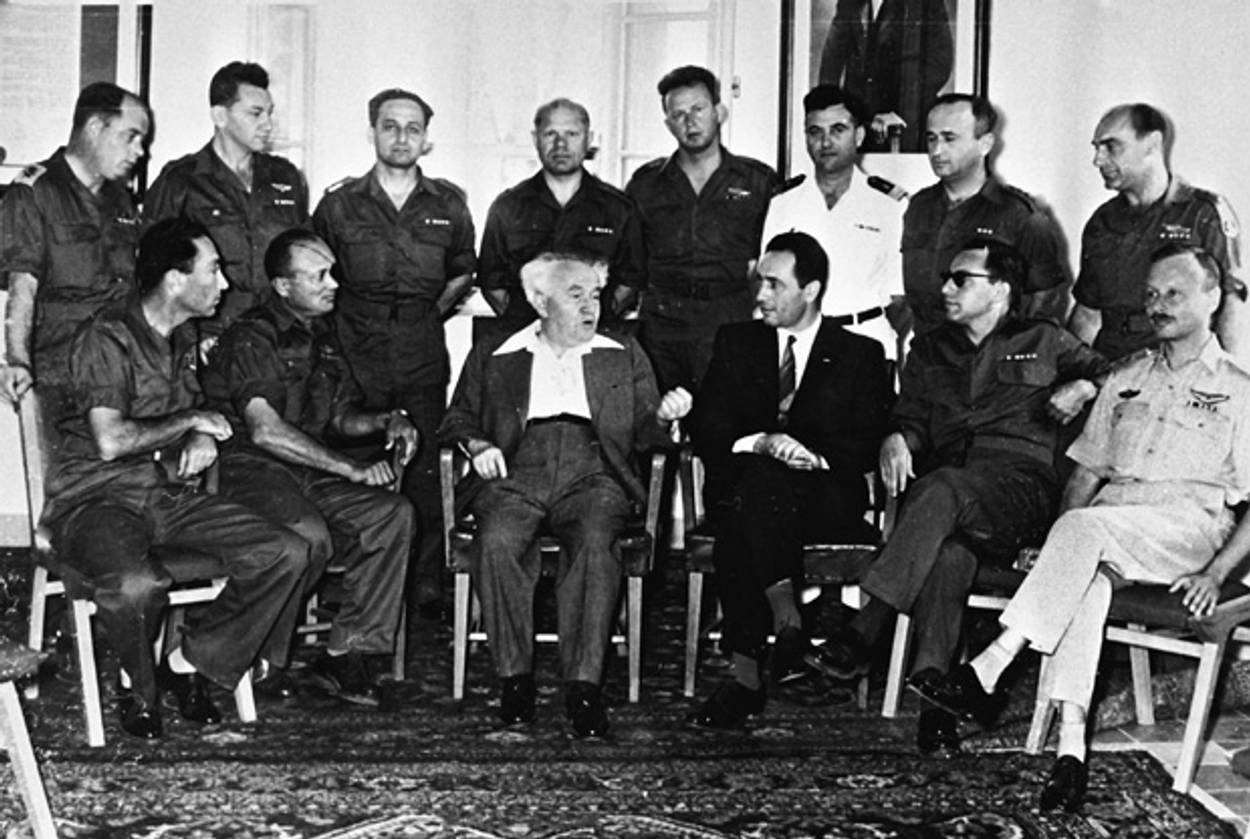Rules of Engagement
The president of Israel remembers Ben-Gurion’s 1948 decision to exempt young Orthodox men from military service




In Ben-Gurion: A Political Life, a new biography from Nextbook Press, Israeli President Shimon Peres reflects on David Ben-Gurion’s legacy with Israeli journalist David Landau. The following is an excerpt from the book.
DAVID LANDAU: You were his emissary in the matter of exempting yeshiva students from army service. Would you say that his subtext in this mission of yours was that with time this problem would simply disappear, or at least would not grow? History has of course shown that that was not the case, and the yeshivot have grown exponentially.
SHIMON PERES: His purpose was to remove every obstacle on the path to the creation of the state, which for him was an ongoing process, not a one-time event that took place in 1948. He wasn’t thinking about what was going to happen later. He sent me on many assignments. For some reason he thought I could do things, let’s say, unconventionally. So for all sorts of unconventional things, he’d send me. He once asked me, for instance, to set up a national soccer team that would beat the world.
LANDAU: And why weren’t you successful?
PERES: Because it was impossible. There’s a limit to what you can do.
LANDAU: You didn’t think of buying foreign players?
PERES: No, it never occurred to me. The team was going to be purely Israeli.
LANDAU: So this was one of your failures?
PERES: Yes, you can put that on the list. Anyway, to be completely frank, in negotiating with the venerable rabbis, I felt like I was sitting with my grandfather.
LANDAU: Who was murdered by the Nazis.
PERES: Yes, who was burned to death in his synagogue as the head of his community. And who influenced my life, in a positive way, more than anyone else. Personally, I had yirat kavod [reverence] toward these people. I didn’t sit with them to haggle. At the same time, I knew that Ben Gurion’s approach was mamlachti [unifying despite difference] and that was the basis of my mission. First, I asked myself: Imagine there were Buddhists in Israel and they’d asked for 150 of their people to be monks. I would have approved. So for Jews not? Second, they claimed very cogently that throughout the Diaspora period even the czars and other rulers had facilitated the existence of yeshivot. Did I want all the yeshivot to be abroad? I thought this was a powerful argument. I reported everything to Ben-Gurion—except the bit about feeling like I was sitting in front of my grandfather.
LANDAU: That’s what I wanted to ask: Could you have said to Ben-Gurion that you felt reverence for these people?
PERES: Yes, I had no difficulty with that. But strange though it may sound, I’m shy. I’m an introvert. So I didn’t mention it. But not because I was worried about how he would have reacted. I had no fear of Ben-Gurion that way.
Shimon Peres has been president of the State of Israel since 2007. He also served two terms each as prime minister and foreign minister. One of the architects of the Oslo Accords, he was awarded the Nobel Peace Prize in 1994. David Landau was editor-in-chief of Haaretz from 2004–2008. Before joining Haaretz, he was diplomatic correspondent for the Jerusalem Post and its managing editor. He currently writes for The Economist.
Shimon Peres has been president of the State of Israel since 2007. He also served two terms each as prime minister and foreign minister. One of the architects of the Oslo Accords, he was awarded the Nobel Peace Prize in 1994. David Landau was editor-in-chief of Haaretz from 2004–2008. Before joining Haaretz, he was diplomatic correspondent for the Jerusalem Post and its managing editor. He currently writes for The Economist.